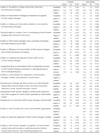Abstract
Objectives
Refugees from North Korea are at risk of a range of mental health problems, posing urgent problems to their care. A review of research on mental health prevalence and services can indicate directions for further study.
Methods
The authors administered a Delphi survey to 16 professionals who are working for North Korean refugees, including professors and field workers. The collected data was analyzed by descriptive statistics including mean and standard deviation and verified with content validity ratio.
Results
The results are as follows: 1) The most serious problem in the research area is the importance of quantitative research rather than qualitative for North Korean refugees, who are often very negative and uncooperative with questionnaires. 2) There is a great need to develop competence of mental health professionals who are working for North Korean refugees. 3) Most participants agreed to the necessity of longitudinal study to define the factors facilitating successful adaptation among North Korean refugees.
Conclusion
The following are our recommendations: 1) Appropriate measurements for North Korean refugees need to be developed reflecting their uniqueness. 2) Research of North Koreans has inherent selection bias. 3) It is essential to provide primary education on mental health to North Korean refugees.
Figures and Tables
References
1. Kim YS. Resocialization of North Korean refugees. J Soc Sci. 2004; 12:118–148.
2. UniKorea.go.kr [homepage on the Internet]. Data and statistics. updated 2014 Oct 1. cited 2014 Nov 17. Available form: http://www.unikorea.go.kr/content.do?cmsid=3099.
3. Ryan AS, Epstein I. Mental health training for Southeast Asian refugee resettlement workers. Int Soc Work. 1987; 30:185–198.

4. Baider L, Kaufman B, Ever-Hadani P, De-Nour AK. Cooper CL, editor. Destiny of hope: immigrant couples coping with multiple stresses. Handbook of stress, medicine, and health. Boca Raton: CRC Press;1996. p. 291–306.
5. Kim YJ. Diaspora experience of North Korean adolescents defector [dissertation]. Seoul: Ewha Womans University;2012.
6. Hong CH, Yoo JJ, Cho YA, Eom J, Ku HJ, Seo SW, et al. A 3-year follow-up study of posttraumatic stress disorder among North Korean defectors. J Korean Neuropsychiatr Assoc. 2006; 45:49–56.
7. Kim HK, Oh SS. The MMPI-2 profile of North Korean female refugees. Korean J Psychol Gen. 2010; 29:1–20.
8. Kim BC, Yu SE. North Korean defectors panel study: economic adaptation mental health physical health. Seoul: North Korean Refugees Foundation;2010. p. 68–94.
9. Seo I, Lee YH, Lee MK, Choi GS. Health for North Koreans refugees in China. Korean Unification Stud. 1999; 3:307–328.
10. Lee Y, Lee MK, Chun KH, Lee YK, Yoon SJ. Trauma experience of North Korean refugees in China. Am J Prev Med. 2001; 20:225–229.

11. Roh DK. The influences of individual differences on adjustment and mental health in North Korean refugees [dissertation]. Seoul: Chung-Ang University;2001.
12. Cho YA, Jeon WT, Yu JJ, Um JS. Predictors of depression among North Korean defectors: a 3-year follow-up study. Korean J Couns Psychother. 2005; 17:467–484.
13. Eom TW, Lee KY. The relationship among social problem solving capability, social support and depression of North Korean defectors. Ment Health Soc Work. 2004; 18:5–32.
14. Kim MR. The effect of the perceived adjustment stress and the coping resources on the depressive symptoms of the North Korean defectors-the comparison between men and women. Ment Health Soc Work. 2005; 20:95–124.
15. Kim YH. A study on North Korean defectors' mental health: an application of a stress process model [dissertation]. Seoul: Seoul National University;2006.
16. Kim HA, Jun MN. Individual difference in North Korean refugee's on MMPI. Korean Unification Stud. 2003; 7:129–160.
17. Kim CO. Physical health problems of North Korean defectors women: centers on the wife. Seoul: Institute for North Korean Studies Yonsei University Symposium;2004. p. 3–20.
18. Kim SJ, Park YS, Lee H, Park SM. Current situation of psychiatry in North Korean: from the viewpoint of North Korean medical doctors. Korean J Psychosom Med. 2012; 20:32–39.
19. Lee JS. Delphi method. Seoul: Kyoyoobook;2006.
20. Dalkey NC, Brown BB, Cochran S. The Delphi method: an experimental study of group opinion. Santa Monica, CA: Rand Corporation;1969.
22. Keum MJ, Cho YA, Kim HA. North Korean defectors counseling center operating effectiveness evaluation. Seoul: Korea Hana Foundation;2011.
23. Green BL, Friedman MJ, de Jong J, Solomon SD, Keane TM, Fairbank JA, et al. Trauma interventions in war and peace: prevention, practice, and policy. New York: Kluwer Academic Publishers;2001.
24. Eom TW. A study on the system of delivery of mental health services for the making foundations of readjustment Korean among north defectors. Unification Policy Stud. 2006; 15:287–316.




 PDF
PDF ePub
ePub Citation
Citation Print
Print






 XML Download
XML Download